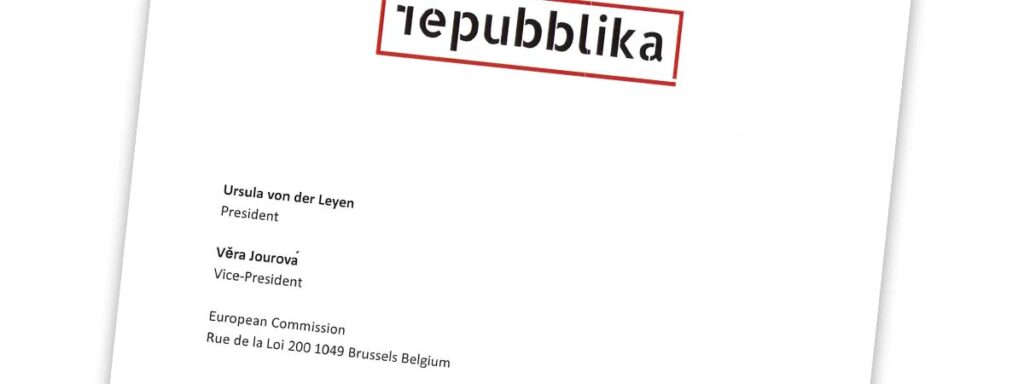Ursula von der Leyen
President
Vera Jourova
Vice-President
European Commission
Rue de la Loi 200 1049 Brussels Belgium
17 January 2022
Dear President Von der Leyen, Vice-President Jourova,
Re: Media freedom ‘reforms’ in Malta
Repubblika welcomes your commitment to protect journalists and to support their work.
We are emboldened to note Vice-President Jourova’s recent declaration that “Media are a pillar of democracy. But today this pillar is cracking, with attempts by governments and private groups to put pressure on the media. This is why the Commission will propose common rules and safeguards to protect the independence and the pluralism of the media. Journalists should be able to do their work, inform citizens and hold power to account without fear or favour.“1
Repubblika urges you to keep your guard up and oversee with due caution claims by the Maltese authorities that they have done anything material to address the challenges faced by journalists in Malta.
We ask you to use your good offices to encourage the Maltese authorities to open their decision-making process to public scrutiny, to invite and welcome public participation in the development of policies governing the democratic rules of State, and to stop considering civil society as traitors and an enemy but rather as an indispensable player in a polity that deserves to be called ‘democratic’.
We are impatient to close the chapter opened by the horror of Daphne Caruana Galizia’s execution. We are as impatient as you probably are to reach the day when we can say that Malta – that Europe – has healed itself and is now back firmly on a democratic path.
But we cannot do so prematurely. If we were to accept a fake ‘reform’ that introduces cosmetic changes to cover up the persistence of risks to free speech, we will increase the risk to journalists working in Malta, we will amplify the chilling effect of the threats they face, and we will contribute to the indefinite postponement of the restoration of Malta’s democracy.
As you are no doubt aware, an independent public inquiry following the 2017 assassination of journalist Daphne Caruana Galizia2 has found that “all the evidence in this Inquiry led to the conviction that Daphne Caruana Galizia’s assassination is intrinsical if not exclusively linked to her investigative work, with allegations of irregularities and administrative abuses in the realisation of major development projects in which elements of big business in the country were involved.“3 The inquiry found Daphne was killed because of her work as a journalist exposing political corruption and mafia infiltration in public institutions, and as a result of actions or failures by the State, particularly the former prime minister Joseph Muscat and his ministerial cabinet.
The inquiry put forward a set of recommendations for reforms including changes to Malta’s Constitution, to the criminal code, and to other legislation, imposing on public authorities transparency and accountability and empowering and obliging State actors to combat corruption and mafia infiltration. Such reforms are fundamental to the safety of journalists, particularly those who investigate and expose corruption and criminal infiltration.
Prime Minister Robert Abela’s claim that his government has in these 6 months implemented most of the Daphne Caruana Galizia public inquiry recommendations has no basis in reality whatsoever.
We write to you out of concern about developments that appear designed by the Maltese authorities to secure the European Commission’s unwitting endorsement of their activities and to ensure that, in practice, the reforms proposed by the public inquiry are not implemented effectively.
Perhaps sharing our impatience for implementation of long-outstanding reforms, Malta’s Parliamentary Opposition tabled a private members’ bill attempting to transpose the inquiry’s recommendations into legislative proposals. Prime Minister Robert Abela has, however, dismissed the bill out of hand and has blocked its introduction to Parliament’s agenda.4
Soon after the announcement of the Opposition’s bill, the government announced the setting up of a ‘committee of experts’ tasked with examining a set of as yet unpublished legislative proposals that have already been drawn up by the government, and with ‘examining the media sector’.5 The government claims its actions are in line with the public inquiry’s recommendations.
It is our considered opinion that the government’s actions fall far short of the public inquiry’s recommendations. The inquiry recommended a lot more than merely engaging experts to comment on a set of secret legal instruments drawn up without any public consultation.
In fact, the inquiry report states that: ”. . . the State should examine in depth the state of journalism and the exercise of the fundamental right to freedom of expression with a view to implementing, among others, the recommendations of this Board in a holistic and organic framework also aimed at giving the profession of journalists the recognition it deserves and giving value to the work they do in the interest of democracy. This exercise could involve amendments to the Constitution and the Laws, also aimed at ensuring adequate protection and support for the profession. In the Board’s view, this exercise could be entrusted to a committee of experts composed of academics, media law experts, journalists and media house owners. This study should lead to specific recommendations being made for consideration by Parliament within a short timeframe, to be established.“
There has been no in-depth examination of the state of journalism and of the exercise of the fundamental right to freedom of expression, certainly, none that either we or the public has ever been made aware of. It is difficult to understand how this ‘committee of experts’ can plausibly analyse and provide constructive input to the government’s secret proposals within the 2-month time limit imposed on them by the government. Their terms of reference, such as they are, also make no mention of any public consultation to be carried out and certainly allow no material time for any.
We are troubled to note that, to date, the government has rejected calls to openly back the view that the free media should be recognised as the fourth pillar of democracy. And we are troubled by the fact that we appear to have no opportunity to present our arguments on why it should be.
The government has claimed it had conducted extensive consultations in order to draw up its secret proposals. We have not been given an opportunity to provide any input at any stage of the preparation of these proposals as no public call for consultations was ever made. Some organisations and persons were, we are informed, privately invited to give their views but, to our knowledge, none of them has been told which of their recommendations have been adopted and which have been discarded and we are aware that, in at least some cases, the consultation ended without any agreement. Furthermore, the government has ignored offers of technical assistance by international press freedom and free expression NGOs.6
We are also concerned with the composition of the ‘committee of experts’ that includes members whose actions and public statements are in diametric opposition to the conclusions of the inquiry.
This, combined with the opacity of the government’s process of consultation and of selecting and appointing the committee, must be seen in the context of our experience in the past several years with the government’s conduct when implementing reforms that should, in theory, have arrested the rapid and inexorable deterioration of democratic norms. We believe that the Maltese authorities are seeking to cherry-pick from the inquiry recommendations, measures that have a neutral impact when introduced in isolation but would seal the challenges to media freedom that killed Daphne Caruana Galizia as a permanent and legitimised framework for Malta’s ever more flawed democracy.
Please be informed that we shall be publishing a copy of this letter for the information of the Maltese media. We remain, in the meantime, at your disposal to provide any information that may be relevant to your inquiries.
Yours sincerely,

Robert Aquilina
President
Cc Robert Abela
Prime Minister
Roberta Metsola
Vice-President, European Parliament, 60, rue Wiertz B-1047, Brussels, Belgium
Charles Michel
President, Council of the European Union, Rue de la Loi 175, B-1048, Brussels, Belgium
1 European Commission, European Media Freedom Act: Commission launches public consultation, 10 January 2022,
https://ec.europa.eu/commission/presscorner/detail/en/ip_22_85
2 Mallia, M (Chairman), Rapport tal-lnkjesta Pubblika Daphne Caruana Galizia, 29.07.2021,
https://www.gov.mt/en/Government/DOI/Press%20Releases/Documents/pr211432a.pdf
3 Translation by Daphne Caruana Galizia Foundation.
https://www.daphne.foundation/en/2021/11/20/public-inquiry-translation
4 Vella, L, Labour will not move PN anti-corruption bills for first reading, maltatoday.com, 15 January 2022 4:12 p,
https://www.maltatoday.com.mt/news/national/114393/labour_will_not_move_pn_anticorruption_bills_for_first_reading#.YeVNef7MJhE
5 Government of Malta, Establishment of a Committee of Experts on Media, 11.01.2022,
https://www.gov.mt/en/Government/DOI/Press%20Releases/PublishingImages/Pages/2022/01/11/pr220024/pr220024a.pdf
6 Article 19, Implementing Inquiry recommendations must meet international standards, 14 January 2022,
https://www.article19.org/resources/implementing-inquiry-recommendations-must-meet-international-standards/





